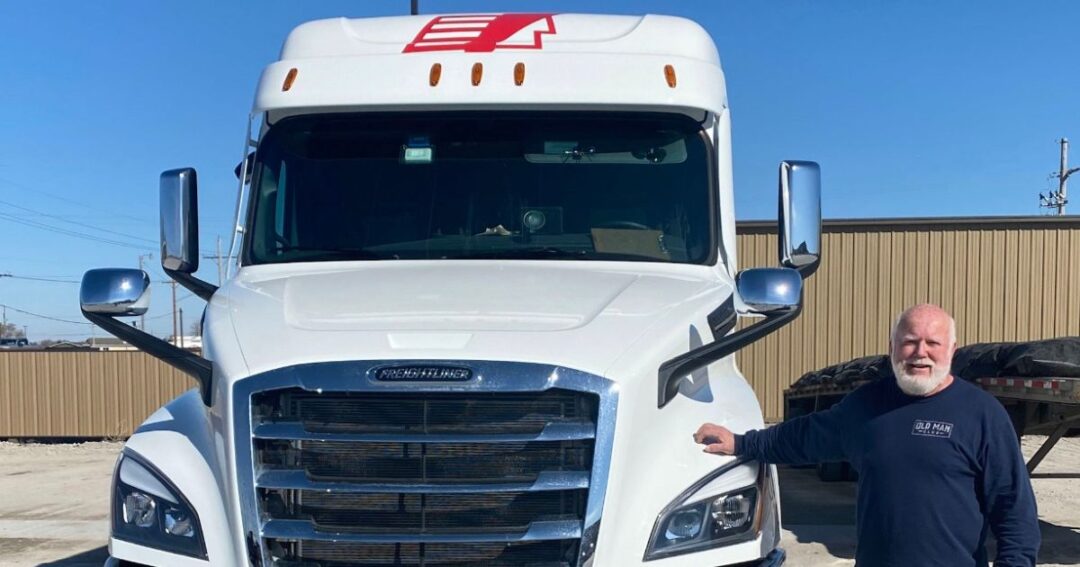Tips for Drivers on Navigating Truck Brokers’ Challenges
As a driver, dealing with truck brokers can sometimes feel like navigating a minefield. Missed communications, surprise fees, unrealistic delivery expectations… sound familiar?
On this episode of Driven Too Far, Andrew Winkler sat down with Dan Adams, a seasoned pro from Manager from Chief Logistics, to break down the most common broker issues in trucking and offer some real-world solutions.
What is a Freight Broker?
Before diving deep into the struggles of truck brokers or freight brokers, we must discuss their role in the trucking industry. What it’s a truck broker and what do they do? A freight broker is a middleman between shippers and carriers.
They help connect companies or individuals who need goods transported with trucking companies that can provide the service.
Why Do Truck Brokers Matter?
Truck brokers play a crucial role in the transportation of goods across the country. They act as a bridge between shippers and carriers, creating opportunities for both parties to maximize efficiency and profits.

Communication Breakdown: Why Can’t Brokers Just Talk to Dispatch?
Ever wondered, “Why do I have to talk directly to a freight broker? Can’t they just give my dispatcher all the details?” While some drivers prefer a direct line to the broker, others find it an unnecessary hassle.
The truth is there are valid reasons why brokers often choose to communicate directly with drivers.
For one, it helps prevent fraud and ensures that there’s a real driver behind the wheel. It also helps them verify information like the carrier’s name on the truck to avoid any surprises at the shipper. Plus, building relationships with drivers can lead to smoother transactions and better rates in the future.
The Telephone Game: USA Truck Brokers #1 Problem
But what about the dreaded “telephone game”? We’ve all experienced the frustration of information getting lost in translation when it passes through multiple people.
This can happen in any industry but is especially prevalent in the transportation industry, where there are often multiple parties involved in a single transaction.
USA Truck Brokers has recognized this as one of the main problems when communicating with drivers. Information can get distorted, important details can be left out, and misunderstandings can occur.
The solution? Open and direct communication. Encourage your dispatcher to share all the details they get from the broker, and don’t hesitate to ask clarifying questions if something seems unclear.

Transparency in Rates: How Do Brokers Set Pricing?
Another frustration drivers have with truck brokers is the lack of transparency around rates. It’s easy to assume that brokers are raking in huge profits while drivers barely scrape by. But is that really the case?
In reality, brokers operate in a competitive market where rates are influenced by several factors, including the spot market, lane variations, and the type of load (e.g., hazmat, oversized). USA truck brokers, like those at Chief Logistics, aim to offer competitive rates based on the prevailing market conditions.
So, how can you ensure you’re getting a fair shake? Research typical rates for your lanes using online tools or load boards. Don’t be afraid to negotiate, and remember that building a good relationship with a broker can lead to better rates down the line.

Why Do Drivers Feel Left in the Dark When It Comes to Truck Brokering?
Many drivers feel like they’re intentionally left in the dark about important details, leading to unpleasant surprises down the road.
While there are certainly some shady operators in the truck brokering world, many brokers genuinely want to be upfront and honest with drivers. After all, a happy driver is more likely to haul their loads again.
If you feel like a broker needs to be more transparent, feel free to ask questions. Get all the details about the load, including pickup and delivery requirements, any special instructions, and what happens if there are delays.
These are some of our recommendations.
- What is the pickup location and time?
- What is the delivery location and time?
- What are the special instructions for pickup and delivery?
- What is the weight and dimensions of the load?
- What type of trailer is required?
- What is the rate for the load?
- What is the payment terms?
- What is the expected transit time?
- What is the cancellation policy?
- What is the claims process?
Freight Brokers and Phone Calls vs. Apps
Technology also plays a big part when it comes to truck brokers. In today’s tech-driven world, many drivers feel like their privacy is being invaded, while brokers are under pressure from shippers to provide real-time visibility.
So, what’s the solution? Technology, when used correctly, can actually make life easier for both parties. Tracking apps can reduce the need for constant phone calls, and unlimited data plans make concerns about data usage less relevant.
If you’re worried about being tracked, remember that your phone is likely already tracking your location for other purposes (think Google Maps). Focus on finding a freight broker who uses tracking technology responsibly and communicates their tracking policies clearly.

Solving Unrealistic Expectations and Delivery Times With Open Communication
Tight delivery windows are a fact of life in the trucking industry, but sometimes brokers set unrealistic expectations due to miscommunication or pressure from shippers. This can leave drivers feeling stressed and tempted to push their hours of service limits.
Communication is key here. If you foresee any issues that could affect your delivery time, let the broker know immediately. They may be able to work with the shipper or receiver to find a solution.
Detention, Layover, and Other Pay Disputes in the Truck Broker Industry
Lastly, getting paid for detention or layover time can be a major hassle. Often, drivers feel like they’re caught in the middle between the broker and the shipper or receiver.
The best way to protect yourself is to document everything. Get in and out times signed off on your paperwork, and keep a record of any communication with the broker or dispatcher about delays. If you need help getting paid, feel free to ask the broker to advocate on your behalf.
They have a vested interest in keeping their drivers happy and may be able to get the payment issue resolved more quickly. In addition, make sure you understand the terms of your contract with the broker.
Some contracts may specify a maximum amount of time for detention or layover pay, while others may not provide any compensation at all. It’s important to know what you’re entitled to so that you can negotiate for fair compensation.

Understanding Your Freight Broker
Working with truck brokers can be challenging, but it’s an unavoidable part of the trucking industry. By focusing on clear communication, researching potential partners, and understanding your rights, you can navigate these challenges and build successful relationships with brokers.
Remember, at Chief Carriers, we’re committed to making your life on the road easier.
We believe that every driver deserves a fulfilling career that aligns with their personal and professional goals. We’re here to support you every step of the way, from finding the perfect truck driver job to navigating the challenges of the trucking industry.
Whether you’re a driver seeking to elevate your safety game or a company aiming to fortify your fleet against risks, there’s no better time than now. Reach out and get involved.
So, if you’re ready to take the next step, give us a call or visit our website. We’re here to help you find your way home.
Driven Too Far Podcast it’s produced by Two Brothers Creative.

